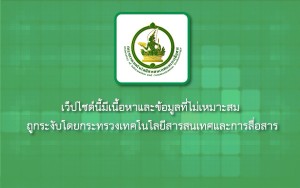Dogging the Footsteps of China— A “Great Firewall” in Thailand?
Recently, Thailand’s government has revealed a proposal to consolidate all internet gateways in the country into one single entity. This proposal has been treated with suspicion by the general public, who sees it as an attempt by the government to monitor the internet. The Ministry of Information and Communications Technology (ICT Ministry), which has been instructed to implement the project, addressed the subject last week and claimed the motive behind this initiative to be purely economic.

According to the new ICT Minister Uttama Savanayan, the project will boost the country’s digital economy by lowering the cost to internet providers, but this claim has been treated with suspicion among the public. There already exists a competitive market of many companies operating and providing gateway services. Why would Thailand need a single internet gateway that might easily turn into a cyber disaster due to the enormous volume of internet traffic? This question remains unanswered, and the Thai public has become worried about the plan’s threat to privacy and personal information.
The public’s suspicion is not unjustified. According to the accidental cabinet summary dated September 4, the proposal is, in fact, designed for security purposes. The development order, authorized by Prime Minister Prayut Chan-o-cha, states that the “single gateway [is] to serve as a tool to control access to inappropriate sites, and the influx of information from abroad.” A government-monitored, state-owned gateway would surely enable the government to tighten control of the internet, but it comes at a severe cost of the loss of individual privacy.
Recognizing the plan’s drawbacks, angry internet users called on social media to log on to government websites simultaneously, thus overloading their capacities and forcing them off sites. The first attack took place at about 10 p.m. on September 30, organized by the "Anti-CAT Tower Mob" with the support of its 127,000-plus Facebook followers. By midnight, several sites such as those of the prime minister and the ICT ministry had been affected.
Although those websites quickly recovered, Prayut was receptive to the public outcry. He insisted that the plan is only being studied, and he has not authorized any government agencies to implement it. ”Nothing has been done yet…The single gateway was raised as only one of several options,” said Prayut, but the public did not appear to buy the Prime Minister’s words anymore. Yesterday, a group of cyber activists threatened to wage concentrated attacks on state websites unless the government formally scraps away the initiative by October 14. In response to this new round of protests, the government has warned the activists to moderate their campaign and has provided reassurance that the gateway initiative is still in the phase of being studied. However, the fight for online freedom is likely to continue unless the government backs down and formally abandons the proposal.
